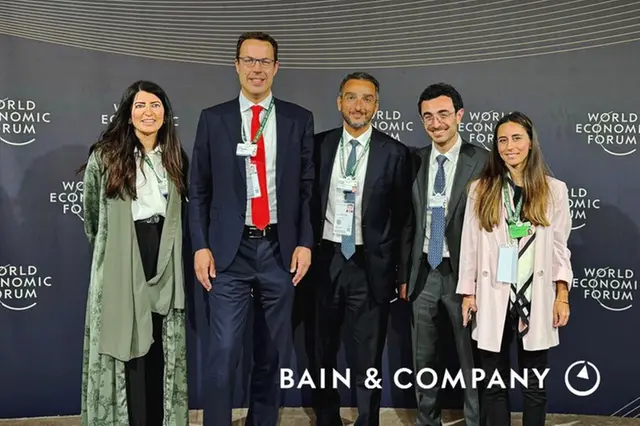Bain & Company participated in the World Economic Forum Special Meeting on Global Collaboration, Growth, and Energy for Development, held in Riyadh on April 28 and 29, under the patronage of His Royal Highness Prince Mohammed bin Salman bin Abdulaziz Al-Saud, Crown Prince and Prime Minister of the Kingdom of Saudi Arabia.
The Special Meeting brought together more than 1,000 leaders, including 220 heads of state and governments, and ministers, to address the pressing economic and environmental challenges facing both emerging and developed markets.
The forum served as a crucial platform for addressing some of the most pressing global development challenges of our time and tackling three key pillars: global cooperation, inclusive growth, and energy for development.
The sessions facilitated by global experts provided a platform for rigorous debate and solution-focused discussions, setting a roadmap for sustained action in the MENA region’s transition to a green economy.
In a pivotal session on “Climate-Resilient Growth in MENA,” Akram Alami, Partner and Head of Aviation, Utilities, and Sustainability & Responsibility Practices, Middle East at Bain & Company, emphasized the importance of advancing the region’s sustainability agenda post-COP28. “Our discussions today underscore the critical need for a comprehensive approach to climate action, where technology and innovative financing play key roles in transitioning to a decarbonized economy,” Alami stated.
Anne-Laure Malauzat, Partner and Head of EMEA Social Impact Practice at Bain & Company, participated in a public panel on “Fast-tracking Progress to Economic Gender Parity.” She highlighted the fragmented progress in gender parity and discussed actionable strategies that can accelerate inclusive economic growth. “The pursuit of economic gender parity isn’t just a moral imperative but a strategic one, essential for unlocking profound economy-wide benefits,” said Malauzat.
The forum also addressed the challenges of decarbonizing supply chains, highlighting the need for enhanced collaboration across sectors to support SMEs and suppliers in their sustainability efforts. Leaders discussed best practices and lessons learned from global and regional sustainability initiatives, aiming to align these efforts with economic strategies such as diversification and innovation.
In addition to these discussions, there was a unique opportunity for networking and partnership development among leaders committed to sustainable practices. These connections are expected to foster cross-sector collaboration, further accelerating the adoption of sustainable solutions across the region.
Reflecting on the event’s success, Akram Alami commented, “This forum has not only highlighted the critical challenges we face but has also sparked a collective commitment to act. The innovative ideas and partnerships formed here are pivotal for our shared vision of a sustainable future.”

